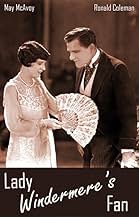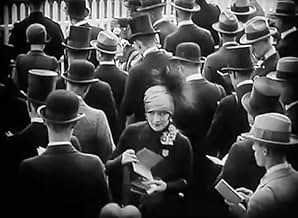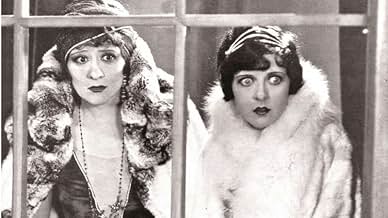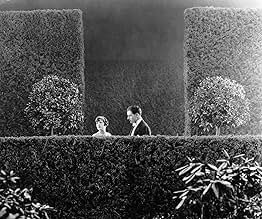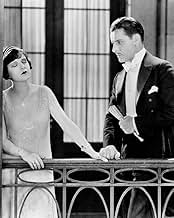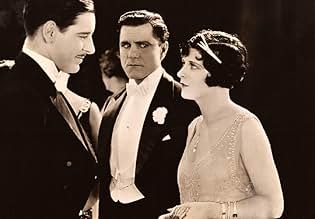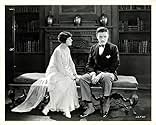CALIFICACIÓN DE IMDb
7.2/10
1.5 k
TU CALIFICACIÓN
Agrega una trama en tu idiomaA society woman believes her husband is having an affair, a misconception which may have dire personal consequences for all involved.A society woman believes her husband is having an affair, a misconception which may have dire personal consequences for all involved.A society woman believes her husband is having an affair, a misconception which may have dire personal consequences for all involved.
- Dirección
- Guionistas
- Elenco
- Premios
- 1 premio ganado en total
Edward Martindel
- Lord Augustus Lorton
- (as Edw. Martindel)
Carrie Daumery
- The Duchess of Berwick
- (as Mme. Daumery)
Billie Bennett
- Lady Plymdale
- (sin créditos)
Michael Dark
- Party Guest
- (sin créditos)
Helen Dunbar
- Mrs. Cowper-Cowper
- (sin créditos)
Frank Finch Smiles
- Waiter with Party Guest List
- (sin créditos)
Larry Steers
- Party Guest
- (sin créditos)
Ellinor Vanderveer
- Party Guest
- (sin créditos)
Percy Williams
- Waiter at the Party
- (sin créditos)
Opiniones destacadas
"Lady Windermere's Fan" is a master class in silent film adaptation by Ernst Lubitsch of Oscar Wilde's play of the same name. Bringing one of Wilde's works, which are justifiably renowned for their clever word play, especially the epigrams, to the silent screen seems an act of folly, but no filmmaker at the time, and perhaps since, had a better sense of visual wit than Lubitsch--an appreciation that extended to the entire withdrawal of Wilde's epigrams from this adaptation, to be replaced largely by the sort of amusing visual gags and situations of the sophisticated romantic comedy, which was then just emerging in cinema, such as in Lubitsch's prior "The Marriage Circle" (1924), and, more specifically, that evolved into the comedy of remarriage genre.
Despite Wilde's caustic wit putting high society in its place, so to speak, the resolution of the play was a product of the Victorian morals and age in which it was written, especially in regards to the role of women as faithful wives and mothers and nothing else. Not only did Lubitsch update it to the modern Roaring Twenties in the sense that there were now automobiles instead of horse-drawn carriages, but he likewise updated its lapses into moralism with a farce that's playful to the end. Additionally, instead of preserving the play's not-so-surprising revelation that Mrs. Erlynne is Lady Windermere's mother, it announces this in Edith Erlynne's first scene; consequently, allowing for much of the humor and intrigue to be restructured around the dramatic irony of the spectator knowing what the characters do not. The updating also remakes Edith into something of a vamp or a flapper, including her wardrobe distinguishing her from the high-society clique. And, although she wishes to join their ranks, so as to marry, she also seems to relish the attention her appearance as a deviant brings her, especially from the opposite sex. I also find it amusing how she recklessly tosses her cigarettes aside rather than placing them in the ashtrays that are always nearby (two subsequent adaptations, "The Fan" (1949) and "A Good Woman" (2004), contain more obvious jokes based on Mrs. Erlynne's smoking). Although Irene Rich as Edith appears fourth in the credits, including below the star-in-the-making Ronald Colman as Lord Darlington, the play's cad, this is Rich's picture. Behind the screen, they must've known this, too, as she steals the show down to the delightfully-altered ending, although the supporting cast is quite amusing, too.
While having the unduplicated distinction of being the most prestigious director in two nations, Germany and, then, the U.S., and in both the silent and sound eras, both critically and in terms of studio clout, it doesn't seem that Lubitsch receives as much appreciation nowadays as do some other filmmakers of his era. Regardless, his "touch" is evident here, from the smart adaptation, well-crafted pacing, grand set design and the peerless comedic timing. And, this was Lubitsch's picture, as Warner Bros. gave him the rare artistic freedom for studio productions, from story selection to final cut. The original racetrack scene is a brilliant series of looks, of binocular-masked point-of-view shots and reverse angles, as Lubitsch parodies society's busybodies cackling over the sight of Edith. Throughout the picture, this system of looks is repeated in scenes where characters peer out windows. At the end of the racetrack scene, there's also a creative shot of Edith passing an "Exit" sign, as Lord Lorton follows her and a wipe closes out the scene just at the right point. Another shot relies for its comedic effect on no camera movement or editing and entirely upon how Lady Windermere re-enters the shot as she debates whether to search her husband's desk drawer.
This would be a rich film to study for its more technical aspects alone: the editing, camera placement, production design, blocking. The garden scene in the party sequence is another good example of this--how the obscuring of the spectator's view of Lady Windermere and Lord Darlington's interaction adds comedic effect while that of Edith's interaction as witnessed by Lady Windermere compounds the dramatic irony. Additionally, Lubitsch was once derisively called the "director of doors" by Mary Pickford, due to their contentious collaboration on "Rosita" (1923), and there's good, if at first seemingly puzzling, reason for the moniker. I believe his emphasis on doors is the backbone of the films' pacing, the movement of the characters and the edits. Even though he insisted on always showing characters enter and exit every door, this film has a decent average shot length of 7.4 seconds, which is also surely helped by the sparing use of intertitles. And those title cards tend to add to the farce, such as the scene focusing on the relation of a gentleman to a lady being indicated by the manner in which he rings her doorbell, which is doubly humorous when considering the director's already-established fascination with the entryways, that he now is diving into their detail with doorbells. Even when a shot seems at first to linger needlessly on the sight of a door being opened and closed, such as when Lady Windermere leaves the garden, it serves a purpose; in that case, it anticipates Edith's following her. It also helps that the doors tend to be absurdly gigantic, with doorknobs sometimes reaching near faces. The enormous sets in general, when aided by well-timed long-shot framings, add literalism to the satirical smallness of the characters amid high-handed society and personal shortcomings.
It's also notable that Lubitsch and company also adapted a 1916 version of the same story and reworked some of its alterations in "opening up" what was originally a three-sets and four-acts play. Film historian Charles Musser goes into some detail comparing the two in the essay, "The Hidden and the Unspeakable: On Theatrical Culture, Oscar Wilde and Ernst Lubitsch's Lady Windermere's Fan." The 1916 film, however, is primitively filmed from distant camera positions, bogged down by wordy title cards, with histrionic acting and more moralizing than even in Wilde's original, but without the satire. This 1925 iteration improves on all of this: an intricate use of the camera based on looks--what characters see and misbelieve they see--, nuanced performances that are allowed to display the registering of character thoughts though a more intimate camera and a pacing that is patient and yet remains energetic, lush settings and aided by the translating of the written witticisms into visual wit.
Despite Wilde's caustic wit putting high society in its place, so to speak, the resolution of the play was a product of the Victorian morals and age in which it was written, especially in regards to the role of women as faithful wives and mothers and nothing else. Not only did Lubitsch update it to the modern Roaring Twenties in the sense that there were now automobiles instead of horse-drawn carriages, but he likewise updated its lapses into moralism with a farce that's playful to the end. Additionally, instead of preserving the play's not-so-surprising revelation that Mrs. Erlynne is Lady Windermere's mother, it announces this in Edith Erlynne's first scene; consequently, allowing for much of the humor and intrigue to be restructured around the dramatic irony of the spectator knowing what the characters do not. The updating also remakes Edith into something of a vamp or a flapper, including her wardrobe distinguishing her from the high-society clique. And, although she wishes to join their ranks, so as to marry, she also seems to relish the attention her appearance as a deviant brings her, especially from the opposite sex. I also find it amusing how she recklessly tosses her cigarettes aside rather than placing them in the ashtrays that are always nearby (two subsequent adaptations, "The Fan" (1949) and "A Good Woman" (2004), contain more obvious jokes based on Mrs. Erlynne's smoking). Although Irene Rich as Edith appears fourth in the credits, including below the star-in-the-making Ronald Colman as Lord Darlington, the play's cad, this is Rich's picture. Behind the screen, they must've known this, too, as she steals the show down to the delightfully-altered ending, although the supporting cast is quite amusing, too.
While having the unduplicated distinction of being the most prestigious director in two nations, Germany and, then, the U.S., and in both the silent and sound eras, both critically and in terms of studio clout, it doesn't seem that Lubitsch receives as much appreciation nowadays as do some other filmmakers of his era. Regardless, his "touch" is evident here, from the smart adaptation, well-crafted pacing, grand set design and the peerless comedic timing. And, this was Lubitsch's picture, as Warner Bros. gave him the rare artistic freedom for studio productions, from story selection to final cut. The original racetrack scene is a brilliant series of looks, of binocular-masked point-of-view shots and reverse angles, as Lubitsch parodies society's busybodies cackling over the sight of Edith. Throughout the picture, this system of looks is repeated in scenes where characters peer out windows. At the end of the racetrack scene, there's also a creative shot of Edith passing an "Exit" sign, as Lord Lorton follows her and a wipe closes out the scene just at the right point. Another shot relies for its comedic effect on no camera movement or editing and entirely upon how Lady Windermere re-enters the shot as she debates whether to search her husband's desk drawer.
This would be a rich film to study for its more technical aspects alone: the editing, camera placement, production design, blocking. The garden scene in the party sequence is another good example of this--how the obscuring of the spectator's view of Lady Windermere and Lord Darlington's interaction adds comedic effect while that of Edith's interaction as witnessed by Lady Windermere compounds the dramatic irony. Additionally, Lubitsch was once derisively called the "director of doors" by Mary Pickford, due to their contentious collaboration on "Rosita" (1923), and there's good, if at first seemingly puzzling, reason for the moniker. I believe his emphasis on doors is the backbone of the films' pacing, the movement of the characters and the edits. Even though he insisted on always showing characters enter and exit every door, this film has a decent average shot length of 7.4 seconds, which is also surely helped by the sparing use of intertitles. And those title cards tend to add to the farce, such as the scene focusing on the relation of a gentleman to a lady being indicated by the manner in which he rings her doorbell, which is doubly humorous when considering the director's already-established fascination with the entryways, that he now is diving into their detail with doorbells. Even when a shot seems at first to linger needlessly on the sight of a door being opened and closed, such as when Lady Windermere leaves the garden, it serves a purpose; in that case, it anticipates Edith's following her. It also helps that the doors tend to be absurdly gigantic, with doorknobs sometimes reaching near faces. The enormous sets in general, when aided by well-timed long-shot framings, add literalism to the satirical smallness of the characters amid high-handed society and personal shortcomings.
It's also notable that Lubitsch and company also adapted a 1916 version of the same story and reworked some of its alterations in "opening up" what was originally a three-sets and four-acts play. Film historian Charles Musser goes into some detail comparing the two in the essay, "The Hidden and the Unspeakable: On Theatrical Culture, Oscar Wilde and Ernst Lubitsch's Lady Windermere's Fan." The 1916 film, however, is primitively filmed from distant camera positions, bogged down by wordy title cards, with histrionic acting and more moralizing than even in Wilde's original, but without the satire. This 1925 iteration improves on all of this: an intricate use of the camera based on looks--what characters see and misbelieve they see--, nuanced performances that are allowed to display the registering of character thoughts though a more intimate camera and a pacing that is patient and yet remains energetic, lush settings and aided by the translating of the written witticisms into visual wit.
At first it might not seem as if the combination of Ernst Lubitsch and Oscar Wilde would work very well, but this silent-screen adaptation of Wilde's "Lady Windermere's Fan" is both enjoyable and well-crafted. Instead of clashing, Lubitsch's stylish, mischievous approach and Wilde's perceptive cynicism complement each other. The characters and the story are Wilde's, the acting and the style are Lubitsch's.
Although the material is heavily re-worked from the original play, Lubitsch's decisions all seem to work pretty well. Wilde's witty and resourceful dialogue is gone, but his insightful portrayals of human nature remain. Lubitsch also makes good use of the camera to bring off some shots that could not have worked on the stage. In particular, at times he makes the fateful fan seem almost a full-fledged part of the cast.
This movie version features solid performances by May McAvoy and Bert Lytell as the Windermeres, with a youngish-looking Ronald Colman suitably ingratiating as Lord Darlington. But Irene Rich has the most interesting character, and as Mrs. Erlynne she also gives a fine performance that particularly stands out in her scenes with the other characters. She and Lubitsch both capture the nature of her unpopular but admirable character, while carefully setting up the contrasts and conflicts between her and the other characters, who are in general more socially acceptable but far less worthy.
This also works well simply as an entertaining, often very amusing, and sometimes dramatically compelling story. For most silent film fans, it would definitely be worth tracking down and watching.
Although the material is heavily re-worked from the original play, Lubitsch's decisions all seem to work pretty well. Wilde's witty and resourceful dialogue is gone, but his insightful portrayals of human nature remain. Lubitsch also makes good use of the camera to bring off some shots that could not have worked on the stage. In particular, at times he makes the fateful fan seem almost a full-fledged part of the cast.
This movie version features solid performances by May McAvoy and Bert Lytell as the Windermeres, with a youngish-looking Ronald Colman suitably ingratiating as Lord Darlington. But Irene Rich has the most interesting character, and as Mrs. Erlynne she also gives a fine performance that particularly stands out in her scenes with the other characters. She and Lubitsch both capture the nature of her unpopular but admirable character, while carefully setting up the contrasts and conflicts between her and the other characters, who are in general more socially acceptable but far less worthy.
This also works well simply as an entertaining, often very amusing, and sometimes dramatically compelling story. For most silent film fans, it would definitely be worth tracking down and watching.
Perhaps only Ernst Lubitsch could have created this masterpiece, a play by one of the world's greatest users of words turned into a silent motion picture.
I remember seeing this at the late and very lamented Silent Movie Theatre on Fairfax in Los Angeles, in the 1970s. And I remember marveling then how Lubitsch was able to create such a magnificent work.
Yes, he had the help of superlative actors -- May McAvoy's performance was truly a revelation -- and of course had the basic Wilde play as well as Julien Josephson's adaption, but it's his camera placement and where the actors performed that make this such a wonder.
I cannot recommend too strongly this "Lady Windermere's Fan," but when you go to YouTube, be careful to check out the various editions before you settle down to watch. One is terrible, but the one I saw is great. Worthy of a great movie.
I remember seeing this at the late and very lamented Silent Movie Theatre on Fairfax in Los Angeles, in the 1970s. And I remember marveling then how Lubitsch was able to create such a magnificent work.
Yes, he had the help of superlative actors -- May McAvoy's performance was truly a revelation -- and of course had the basic Wilde play as well as Julien Josephson's adaption, but it's his camera placement and where the actors performed that make this such a wonder.
I cannot recommend too strongly this "Lady Windermere's Fan," but when you go to YouTube, be careful to check out the various editions before you settle down to watch. One is terrible, but the one I saw is great. Worthy of a great movie.
When a stage play is turned into a movie the results can be dire, especially when the play is a dialog-driven comedy of manners, full of quips and epigrams. Unless it's handled carefully even a great play might come off as 'canned' and lifeless on screen, amounting to little more than what Alfred Hitchcock dismissed as "photographs of people talking." A few exceptions come to mind: The Philadelphia Story, the two versions of Holiday made in the '30s, the Rex Harrison/Margaret Rutherford Blithe Spirit, and a handful of other stage-to-screen adaptations that manage to be lively and entertaining despite heavy reliance on dialog. But these films are surpassed in achievement, in one sense at least, by an adaptation from 1925 which perfectly captures the spirit of the play it presents while scarcely quoting it!
Before seeing Ernst Lubitsch's silent version of Lady Windermere's Fan at the Museum of Modern Art this summer I re-read Oscar Wilde's play, which I enjoyed, but I didn't have high hopes for the movie, despite the involvement of a director I count among my favorites. I imagined the movie would consist of actors standing around in tuxes and evening gowns pretending to mouth witty sayings, which would then be presented to us in numerous title cards; but because I admire Lubitsch's sound films a great deal I thought I'd give it a try. Plus, I thought it'd be interesting to see Ronald Colman in a silent film, deprived of that wonderful voice. What a pleasant surprise to find that this is one of the best sophisticated comedies of the silent screen. The flavor of Wilde's play is distilled to its essence, and clearly conveyed without relying on a single one of his famous epigrams. (Interestingly, a recent biography of Lubitsch says that the film quotes only two or three lines from the play, but if so I didn't catch them.) How is this possible?
Lubitsch conveys Wilde's notions about high society swells and their prejudices cinematically, not verbally. When the notorious Mrs. Erlynne (Irene Rich) appears at the Ascot race track, the reaction of "society" is quickly made clear to us by the scandalized facial expressions of the ladies present; who, nonetheless, can't stop looking at her or talking about her. The tone of their remarks is obvious from their sour expressions. Naturally, the men are interested in Mrs. Erlynne, too. She is shown, montage fashion, from many different angles, through lorgnettes and binoculars, long-shot, extreme long-shot and close-up, and while the horse race is reduced to mere background. It's a funny and informative sequence, yet it isn't in Wilde's play at all. In another scene that more closely follows the text, Lord Darlington (Colman) calls on Lord and Lady Windermere at their home. He is formally announced, and pretends briefly that he actually came to see Lord Windermere on some minor matter. But when Windermere conveniently leaves on business, Darlington, shown in a stately long-shot, strides away from Lady Windermere (May McAvoy), sits, shoots her a sly look, and announces that he is in love with her. Shocked, she crosses and drops into a chair next to him. He rises, crosses away from her, and drops into a different chair. They both look miserable. Fade-out. It's a beautifully staged scene, and no additional dialog is necessary.
Another sequence that occurs late in the film perfectly epitomizes the famous Lubitsch Touch while deftly conveying the spirit of Wilde's play: a title card announces that "The relations between a man and a woman can be told by the way he presses her doorbell." Various ways in which this is so are then demonstrated. You wouldn't think that a close-up shot of a doorbell and a gentleman's gloved hand could be so suggestive, but Lubitsch manages to suggest a great deal.
The black & white cinematography of Lady Windermere's Fan positively shimmers; happily, this is one silent film that has been well preserved. The acting is quite restrained by the standards of the day, and even without his voice Ronald Colman has the presence of a star, while Irene Rich gives the performance of her career. It's a wonderful adaptation of a great play that can stand on its own as cinema; and it may come as a surprise to those who believe silent film comedy begins and ends with Ben Turpin and the Keystone Cops.
Before seeing Ernst Lubitsch's silent version of Lady Windermere's Fan at the Museum of Modern Art this summer I re-read Oscar Wilde's play, which I enjoyed, but I didn't have high hopes for the movie, despite the involvement of a director I count among my favorites. I imagined the movie would consist of actors standing around in tuxes and evening gowns pretending to mouth witty sayings, which would then be presented to us in numerous title cards; but because I admire Lubitsch's sound films a great deal I thought I'd give it a try. Plus, I thought it'd be interesting to see Ronald Colman in a silent film, deprived of that wonderful voice. What a pleasant surprise to find that this is one of the best sophisticated comedies of the silent screen. The flavor of Wilde's play is distilled to its essence, and clearly conveyed without relying on a single one of his famous epigrams. (Interestingly, a recent biography of Lubitsch says that the film quotes only two or three lines from the play, but if so I didn't catch them.) How is this possible?
Lubitsch conveys Wilde's notions about high society swells and their prejudices cinematically, not verbally. When the notorious Mrs. Erlynne (Irene Rich) appears at the Ascot race track, the reaction of "society" is quickly made clear to us by the scandalized facial expressions of the ladies present; who, nonetheless, can't stop looking at her or talking about her. The tone of their remarks is obvious from their sour expressions. Naturally, the men are interested in Mrs. Erlynne, too. She is shown, montage fashion, from many different angles, through lorgnettes and binoculars, long-shot, extreme long-shot and close-up, and while the horse race is reduced to mere background. It's a funny and informative sequence, yet it isn't in Wilde's play at all. In another scene that more closely follows the text, Lord Darlington (Colman) calls on Lord and Lady Windermere at their home. He is formally announced, and pretends briefly that he actually came to see Lord Windermere on some minor matter. But when Windermere conveniently leaves on business, Darlington, shown in a stately long-shot, strides away from Lady Windermere (May McAvoy), sits, shoots her a sly look, and announces that he is in love with her. Shocked, she crosses and drops into a chair next to him. He rises, crosses away from her, and drops into a different chair. They both look miserable. Fade-out. It's a beautifully staged scene, and no additional dialog is necessary.
Another sequence that occurs late in the film perfectly epitomizes the famous Lubitsch Touch while deftly conveying the spirit of Wilde's play: a title card announces that "The relations between a man and a woman can be told by the way he presses her doorbell." Various ways in which this is so are then demonstrated. You wouldn't think that a close-up shot of a doorbell and a gentleman's gloved hand could be so suggestive, but Lubitsch manages to suggest a great deal.
The black & white cinematography of Lady Windermere's Fan positively shimmers; happily, this is one silent film that has been well preserved. The acting is quite restrained by the standards of the day, and even without his voice Ronald Colman has the presence of a star, while Irene Rich gives the performance of her career. It's a wonderful adaptation of a great play that can stand on its own as cinema; and it may come as a surprise to those who believe silent film comedy begins and ends with Ben Turpin and the Keystone Cops.
'Lady Windermere's Fan' is one of the great plays of Oscar Wilde, so it is curious to see it here as a big budget silent film from Warners Brothers. Starring May McAvoy and Bert Lytell as the Windermeres, with Irene Rich as Mrs Erlynne and a young Ronald Colman as Lord Darlington, this film is directed by Ernst Lubitsch, known mainly now for his stylish musicals and dramas from the sound era.
Despite the obvious drawback of not using any of Wilde's text, either spoken or as title cards, this adaptation does succeed in putting across most of the play's plot, just making a little tweak here and there to move the plot along or to bring matters to a satisfactory conclusion. Sets and costumes are of the jazz age and are beautiful, and McAvoy is a winsome Lady Windermere, all indignant eyes and little rosebud mouth.
The film however belongs to Irene Rich who portrays Mrs Erlynne as desperate, calculating, and everything in-between. She was a superb technician without overacting, and it's a pleasure to watch her. Ronald Colman as well shows signs of the star quality to come.
This 'Lady Windermere' is well worth watching.
Despite the obvious drawback of not using any of Wilde's text, either spoken or as title cards, this adaptation does succeed in putting across most of the play's plot, just making a little tweak here and there to move the plot along or to bring matters to a satisfactory conclusion. Sets and costumes are of the jazz age and are beautiful, and McAvoy is a winsome Lady Windermere, all indignant eyes and little rosebud mouth.
The film however belongs to Irene Rich who portrays Mrs Erlynne as desperate, calculating, and everything in-between. She was a superb technician without overacting, and it's a pleasure to watch her. Ronald Colman as well shows signs of the star quality to come.
This 'Lady Windermere' is well worth watching.
¿Sabías que…?
- TriviaOne of the 50 films in the three-disk boxed DVD set called "More Treasures from American Film Archives, 1894-1931" (2004), compiled by the National Film Preservation Foundation from five American film archives. This film is preserved by the Museum of Modern Art, has a running time of 89 minutes and an added piano music score.
- Citas
Opening title card: Lady Windermere faced the grave problem of seating her dinner guests.
- ConexionesFeatured in Historia del cine: Epoca muda (1983)
Selecciones populares
Inicia sesión para calificar y agrega a la lista de videos para obtener recomendaciones personalizadas
- How long is Lady Windermere's Fan?Con tecnología de Alexa
Detalles
- Fecha de lanzamiento
- País de origen
- Idioma
- También se conoce como
- Tajna ledi Vindermir
- Locaciones de filmación
- Toronto, Ontario, Canadá(Racetrack Scene)
- Productora
- Ver más créditos de la compañía en IMDbPro
Taquilla
- Presupuesto
- USD 320,000 (estimado)
- Tiempo de ejecución
- 2h(120 min)
- Mezcla de sonido
- Relación de aspecto
- 1.33 : 1
Contribuir a esta página
Sugiere una edición o agrega el contenido que falta

